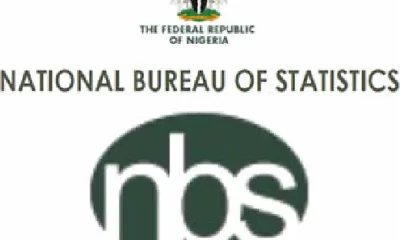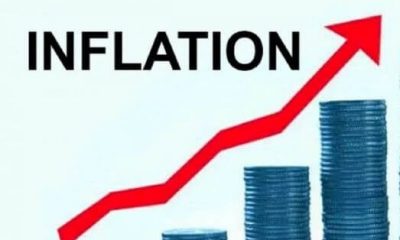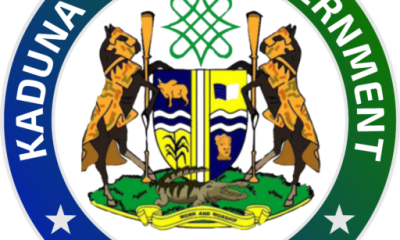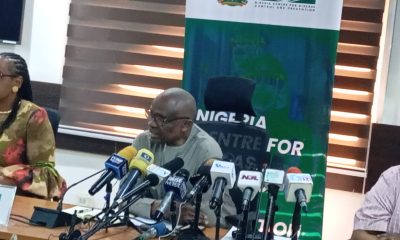Economy
Total Capital Importation Stands at $1,060.73m in Q4 2022 – NBS
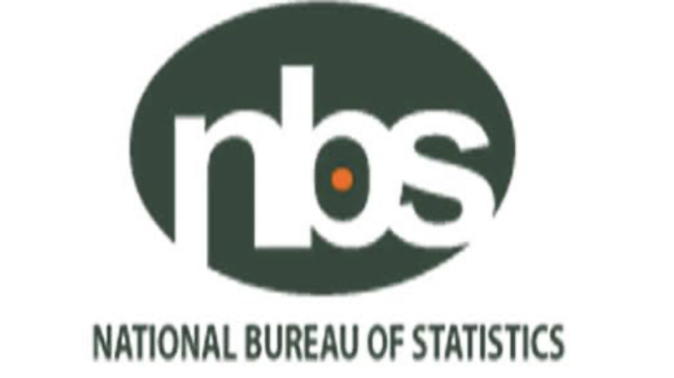
By Tony Obiechina, Abuja
The National Bureau of Statistics (NBS) says total capital importation in Nigeria stood at $1,060.73 million in quarter four of 2022.
The NBS said this through its Nigeria Capital Importation Q4 2022 report released on Wednesday.
It said the Q4 figure was lower than the $2,187.
63 million recorded in Q4 2021, indicating a decrease of 51. 51 per cent.“When compared to the preceding quarter, capital importation also fell by 8.53 per cent from $1,159.67 million in Q3 2022,” it noted.
The NBS said the largest capital importation during the period was received from other investments, which accounted for 65.
17 per cent ($691.23 million) of total capital imported in Q4 2022.The NBS said this was followed by Portfolio Investment with 26.89 per cent ($285.26 million) and Foreign Direct Investments (FDIs) with 7.94 per cent ($l84.23 million).
“Disaggregated by Sectors, capital importation into the production sector recorded the highest inflow of $392.54 million, representing 37.01 per cent of total capital imported in Q4 2022.
“This was followed by capital imported into the banking sector, valued at $255.45 million (24.08 per cent ), and Telecoms with 168.27 million dollars (15.86 per cent),” it added.
The NBS said Capital Importation by Country of Origin reveals that capital from the United Kingdom ranked top in Q4 2022 with $455.24 million, accounting for 42.92 per cent.
It said this was followed by the Republic of South Africa and the United Arab Emirates valued at $119.31 million (11.25 per cent) and $116.82 million (11.01 per cent ), respectively.
By Destination of Investment, it said Lagos State remained the top destination in Q4 2022 with $600.54 million, accounting for 56.62 per cent of total capital investment in Nigeria.
The NBS said this was followed by Abuja, valued at $424.50 million (40.02 per cent).
It said Categorisation of Capital Importation by banks shows that Citibank Nigeria Limited ranked top in Q4 2022 with $308.72 million (29.10 per cent).
This was followed by Standard Chartered Bank Nigeria Limited with $232.45 million (21.91 per cent ) and Rand Merchant Bank with $102.00 million (9.62 per cent).
The NBS, however, said on an annual basis, capital importation was $5,328.88 million in 2022, showing a decrease of 20.47 per cent from $6,700.51 million in 2021.
Similarly, the total value of capital importation into Nigeria in Q3 2022 stood at $1,159.67 million from $1,731.37 million in Q3 2021.
The NBS said the figure indicated a decrease of 33.02 per cent.
“When compared to the preceding quarter, capital importation fell by 24.47 per cent from $1,535.35 million in Q2 2022,” it stated.
It said the largest capital importation in Q3 2022 was received through other investments, which accounted for 54.83 per cent ($635.87 million).
This was followed by Portfolio Investment with 38.12 per cent ($442.08 million) and Foreign Direct Investments (FDIs) with 7.05 per cent ($81.72 million).
Disaggregated by sectors, the NBS stated that capital importation into banking had the highest inflow of $368.95 million, representing 31.82 per cent of total capital imported in Q3 2022.
“This was followed by the financing sector, valued at $314.90 million (27.15 per cent), and capital importation in shares with $104.58 million (9.02 per cent)
The NBS added that Capital Importation by Country of Origin revealed that capital from the United Kingdom ranked top in Q3 2022 with $506.87 million, accounting for 43.7 per cent.
It said this was followed by Singapore and Hong Kong valued at $184.86 million (15.94 per cent) and $106.39 million (9.17 per cent).
Economy
Stockbrokers Propose Strategies to Grow $1trn Economy

Nigerian Stockbrokers have proposed strategies by which the Federal Government can deepen the capital market to achieve its proposed one trillion dollar economy.
They made the proposal in a communique signed by Mr Oluropo Dada, President/Chairman of Council of Chartered Institute of Stockbrokers (CIS), and the Registrar/Chief Executive of CIS, Dr Josiah Akerewusi.
The communique was from the 28th Annual Conference of CIS held in Ibadan with the theme: “Capital Market as Catalyst for The One Trillion Dollar Economy’’.
Dada said that, if adhered to, the proposed strategies would help the government to achieve its goal without increasing borrowing.
He urged the Federal Government to list Nigerian National Petroleum Company Ltd.
and moribund state enterprises on the secondary markets.According to him, this is to deepen the markets, enhance the companies’ ability to make profit and generate revenue for the government through tax.
The CIS president also said that there was the need to rebase Nigeria’s Gross Domestic Product (GDP) to reclaim the country’s status as Africa’s largest economy to create opportunities to achieve the one trillion dollar target.
Dada urged policies that would incentivise indigenous and privatised companies as well as Small and Meduim Enterprises (SMEs) to list on the Nigerian capital market.
He said that the informal economy constituted a significant portion of Nigeria’s GDP but remained largely untapped by the capital market.
“Government should conclude the ongoing review of Investment and Securities Act while capital market regulators should review relevant rules and laws in line with global best practices,’’ he said.
According to him, this will boost investor confidence, create a favourable business environment for listed companies and remove restrictions hindering liquidity access for stockbrokers.
“The Nigerian capital market should be integrated into Fintech solutions, blockchain technology and other digital innovations to enhance accessibility, efficiency, transparency and attraction of Millennials, Gen Z, Gen Alpha, among others.
“Market operators should also develop products that attract investment appetite of the technology-savvy youths,” he said.
According to him, the government should address foreign exchange challenges and other inhibitions to participation of foreign investors in Nigeria.
“This will also enhance Foreign Direct Investment.’’
Dada said there was a huge knowledge gap among investors, urging that financial literacy programmes should be pursued with renewed vigour.
He said that financial literacy should cut across all segments of investors and would require collaboration of market regulators with all stakeholders.
He said: “The Nigerian capital market should reflect the key sectors such as agriculture, oil and gas to better align with GDP composition and provide opportunities for capital formation and mobilisation.
“Government at all tiers in Nigeria should leverage more on the capital market to raise long-term funds for infrastructure development,’’ he said.
Dada said that this should be done by issuing project-tied bonds with irrevocable standing payment order which would remove the risk of default.
“In order to relieve itself of perennial debt overhang, Nigeria should opt for debt restructuring and extension of maturity period to enable it to manage its resources for the overall development of the economy.
“On the monetary side, the Central Bank of Nigeria should intensify tight monetary policy to control inflation.
“Government should exploit opportunities in the commodities ecosystem to grow the GDP. Commodities Ecosystem remains a niche market in Nigeria.
“Government should implement the policies enunciated to strengthen commodity trading and commodity exchanges to enhance export trades, generate forex, boost external reserve and strengthen the Naira.’’
According to him, government should also implement structural reforms, including deregulation, debt management and public awareness campaigns by collaborating with the market stakeholders to unlock Nigeria’s economic potential.
Dada said that the government should put in place policies to attract private equity, venture capitalists and angel investors, adding that at all tiers of the government should leverage tariff policies to support local industries.
This, he said, would pave way for participation of private equity, venture capitalists and angel investors to support the growth of SMEs. (NAN)
Economy
Minister Says Upgrading MAN to Varsity will Unlock Maritime Opportunities

Mr Adegboyega Oyetola, the Minister of Marine and Blue Economy says upgrading the Maritime Academy of Nigeria (MAN), Oron to a university, will unlock opportunities in the maritime economy.
Oyetola made the expression at the 2024 MAN cadets graduation ceremony in Oron, Akwa Ibom on Saturday.
Represented by Mr Babatunde Bombata, the Director, Maritime Safety and Security, the minister said the Federal Government was working assiduously to unlock opportunities within the marine and blue economy.
He said that the ministry was already collaborating with the Ministry of Education and the Nigerian Universities Commission to ensure MAN’s seamless transition to a university.
“It is our hope that this upgrade will unlock new opportunities for advanced learning, cutting edge research and innovation within the marine and blue economy fields,” he said.
Oyetola urged the graduating cadets to be innovative, resourceful and forward looking in their future endeavours.
“The maritime and blue economy sectors are filled with opportunities, so your contributions to the sector will be instrumental in ensuring a brighter future.
“The government is committed to fostering excellence and innovation in these fields, and we eagerly anticipate the positive impact you will make in your careers,” he said.
He further said that the Federal Government was working on developing a national policy on marine and blue economy.
“This policy will serve as a strategic framework to drive economic diversification, attract investments, create jobs and youth empowerment.
In his remarks, Gov. Umo Eno of Akwa Ibom, said the state government would continue to collaborate with the academy to develop the maritime sector.
Represented by the Commissioner for Internal Security and Waterways, Gen. Koko Essien, (Rtd), Eno urged the graduating cadets to utilise their training in developing the maritime sector.
“I am hopeful that you will utilise the training you have acquired here to further your career as seafarers and in the development of our blue economy,” he said.
Eno commended the Acting Rector, Dr Kevin Okonna and his management team for their commitment towards repositioning the academy for greater results.
Earlier, Okonna said that graduates of the institution had contributed immensely to the growth of Nigeria’s maritime and blue economy.
“Today, we have an opportunity to celebrate a new set of well-trained personnel to the maritime and allied industries.
“We pride ourselves as the pioneer maritime training institution, this is because of the institution’s contributions to national development,” he said.
The acting rector urged the graduating cadets to made effective use of the knowledge gained during their training to make meaningful impact on the growth of the maritime sector.
Report says that awards were given to graduating cadets who distinguished themselves in character and learning. (NAN)
Economy
Investors Gain N183bn on NGX

The Nigerian Exchange Ltd. (NGX) continued its bullish trend on Wednesday, gaining N183 billion.
Accordingly, the market capitalisation, which opened at N59.532 trillion, gained N184 billion or 0.31 per cent to close at N59.715 trillion.
The All-Share Index also added 0.31 per cent or 303 points, to settle at 98,509.
68, against 98,206. 97 recorded on Tuesday.Consequently, the Year-To-Date (YTD) return increased to 31.
74 per cent.Gains in Aradel Holdings, Zenith Bank, United Bank For Africa(UBA), Oando Plc, Nigerian Breweries among other advanced equities drove the market performance up.
Market breadth closed positive with 34 gainers and 17 losers.
On the gainers’ chart, Africa Prudential, Conoil and RT Briscoe led by 10 per cent each to close at N14.30, N352 and N2.42 per share, respectively.
Golden Guinea Breweries followed by 9.95 per cent to close at N7.18, while NEM Insurance rose by 9.74 per cent to close at N10.70 per share.
On the other hand, Julius Berger led the losers’ chart by 10 per cent to close at N155.25, Secure Electronic Technology Plc trailed by 9.52 per cent to close at 57k per share.
Multiverse lost 7.63 per cent to close at N5.45, Haldane McCall dropped 6.07 per cent to close at N4.95 and Honeywell Flour shed 5.62 per cent to close at N4.70 per share.
Analysis of the market activities showed trade turnover settled lower relative to the previous session, with the value of transactions down by 49.44 per cent.
A total of 320.10 million shares valued at N6.48 billion were exchanged in 7,943 deals, compared with 939.41 million shares valued at N12.81billion traded in 9,098 deals posted in the previous session.
Meanwhile, ETranzact led the activity chart in volume with 70.27 million shares, while Aradel led in value of deals worth N1.22 billion.(NAN)



